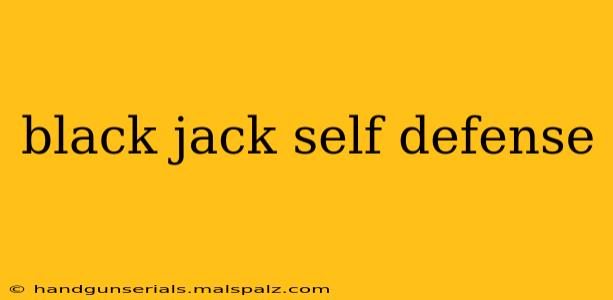Blackjack, also known as a sap, cosh, or bludgeon, is a self-defense weapon with a controversial history. While its use can be incredibly effective in neutralizing a threat, it carries significant legal and ethical implications. This guide explores the intricacies of blackjack self-defense, focusing on its potential benefits, severe drawbacks, and the crucial alternatives that should be prioritized.
Understanding the Blackjack and Its Potential
A blackjack is a flexible, weighted club, typically consisting of a lead or sand-filled pouch encased in leather or fabric. Its flexible nature allows for a more focused impact, potentially causing greater damage than a rigid club of similar weight. The impact area is also generally smaller, potentially allowing for strikes to more vulnerable areas.
Potential Benefits (with strong caveats):
- Disabling blows: A well-placed strike can incapacitate an attacker quickly.
- Relatively concealable: Compared to other weapons, a blackjack can be hidden more easily.
- Potential for surprise: The unexpected nature of a blackjack attack can provide a significant advantage in a self-defense situation.
The Severe Drawbacks of Blackjack Self-Defense
Despite the potential benefits, using a blackjack for self-defense carries substantial risks:
- Legal ramifications: Possession and use of a blackjack are illegal in many jurisdictions. Even in self-defense, you could face severe legal consequences. The prosecution might argue the weapon was used excessively or that other less lethal options were available.
- Ethical considerations: Using a blackjack carries a high risk of causing serious injury, potentially even death. This should be carefully considered in relation to the level of threat faced. There’s a significant difference between using a blackjack against an unarmed attacker and using it against someone armed with a knife or gun.
- Escalation of violence: The use of a blackjack may escalate a situation, potentially attracting more attackers or provoking a more violent response.
- Lack of training: Improper use can lead to injury to both the defender and the attacker. Effective use requires specialized training, which is not readily available for most people.
- Over-reliance: The availability of a weapon can encourage risk-taking and a false sense of security. Self-defense should prioritize situational awareness, de-escalation, and avoidance.
Superior Alternatives to Blackjack Self-Defense
Before even considering a blackjack, prioritize safer and more legally sound self-defense methods:
- Situational awareness: Being aware of your surroundings and avoiding risky situations is the best form of self-defense.
- De-escalation techniques: Learning how to communicate calmly and de-escalate tense situations can prevent violence altogether.
- Self-defense training: Learning non-lethal self-defense techniques, such as Krav Maga, Jiu-Jitsu, or other martial arts, is a much safer and more responsible approach. This provides tools to defend yourself without the legal and ethical concerns of using a weapon.
- Pepper spray: A less lethal option that can temporarily incapacitate an attacker while providing time to escape. Legality varies by location; check your local laws.
Conclusion: Prioritize Safety and Legality
While a blackjack might seem like a simple solution to self-defense, the legal, ethical, and practical drawbacks heavily outweigh its potential benefits. Investing in proper self-defense training and prioritizing preventative measures is far more effective and responsible than relying on a potentially illegal and dangerous weapon. Always consult local laws and prioritize de-escalation and non-violent methods whenever possible. This guide is for informational purposes only and should not be considered legal or self-defense advice. Always seek professional training and legal counsel when dealing with self-defense matters.

